Unit 6 Go With Transportation ! 写作能力提升练课件(共34张PPT)2024-2025学年冀教版英语八年级上册
文档属性
| 名称 | Unit 6 Go With Transportation ! 写作能力提升练课件(共34张PPT)2024-2025学年冀教版英语八年级上册 |
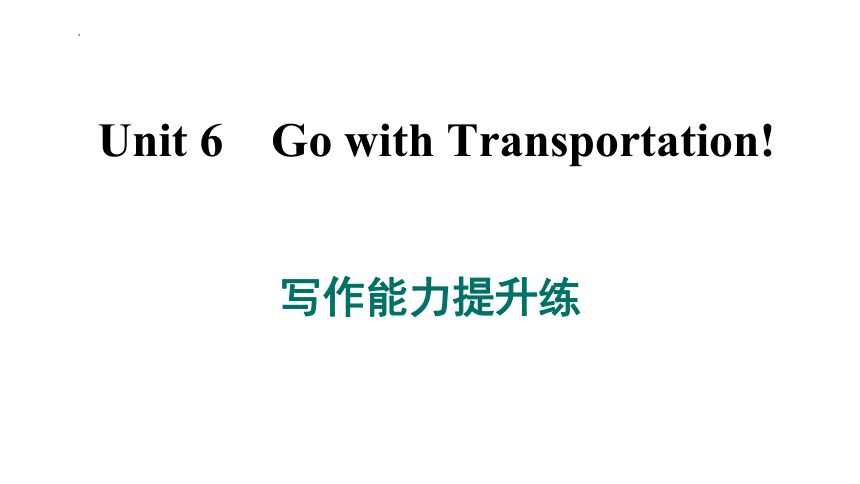
|
|
| 格式 | pptx | ||
| 文件大小 | 283.2KB | ||
| 资源类型 | 教案 | ||
| 版本资源 | 冀教版 | ||
| 科目 | 英语 | ||
| 更新时间 | 2024-12-01 00:00:00 | ||
图片预览


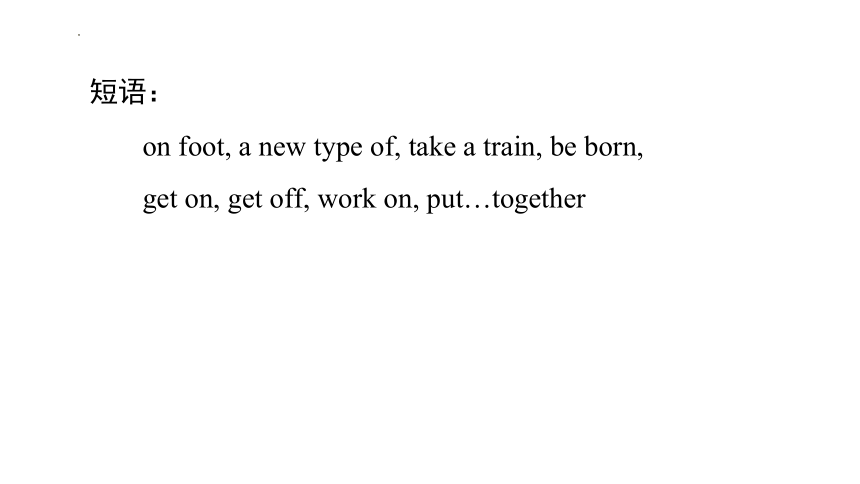
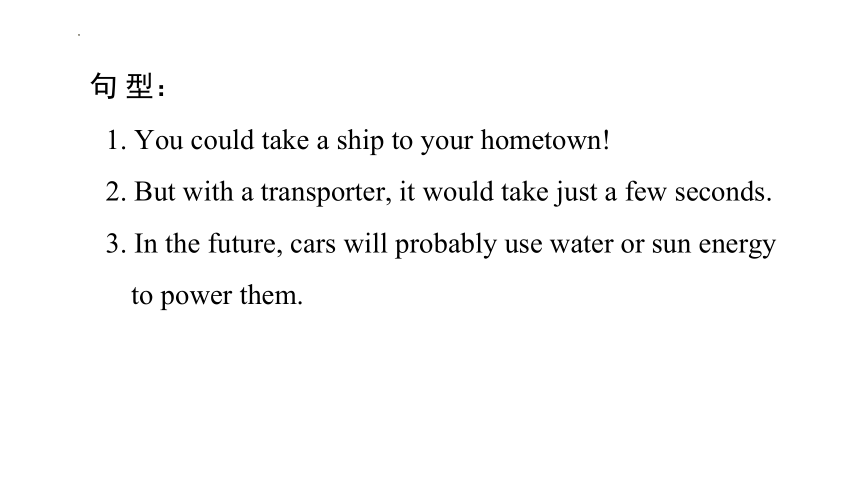
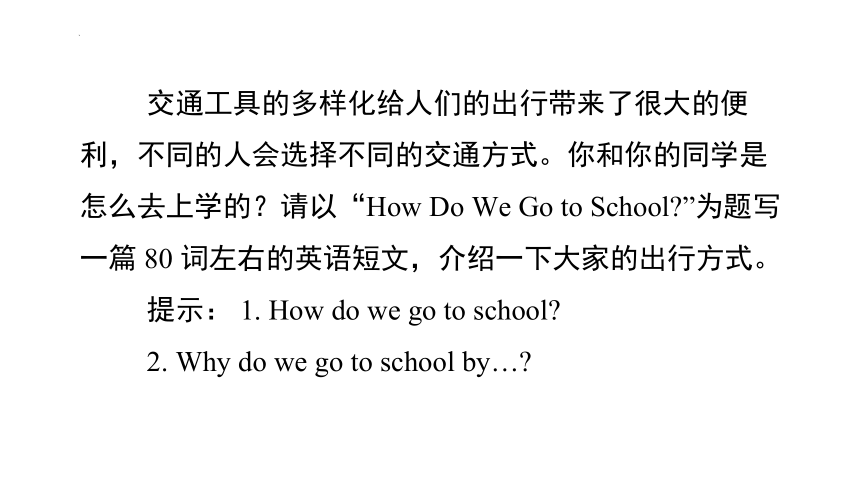
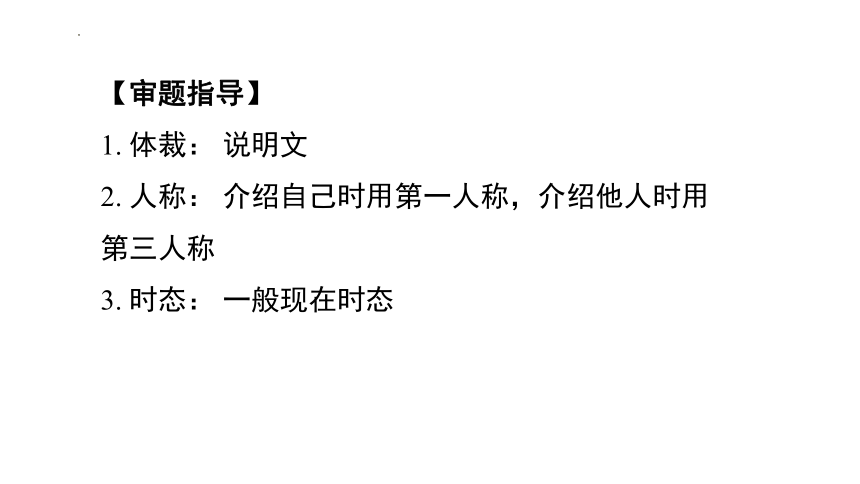

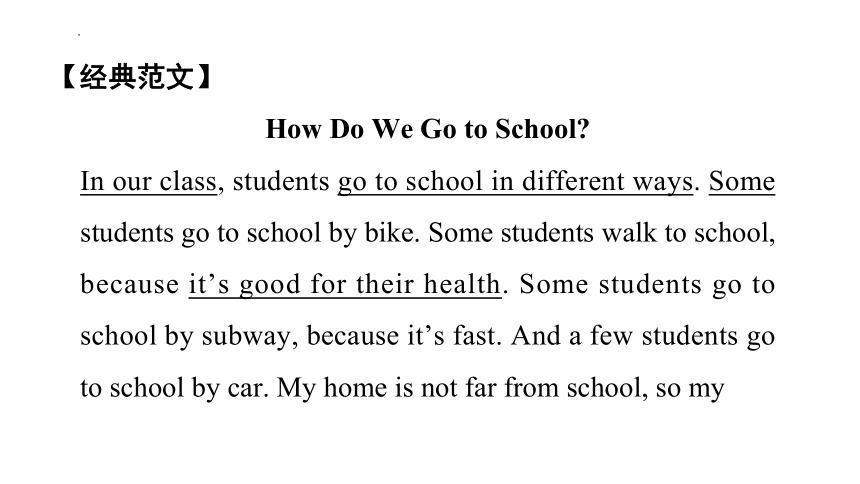
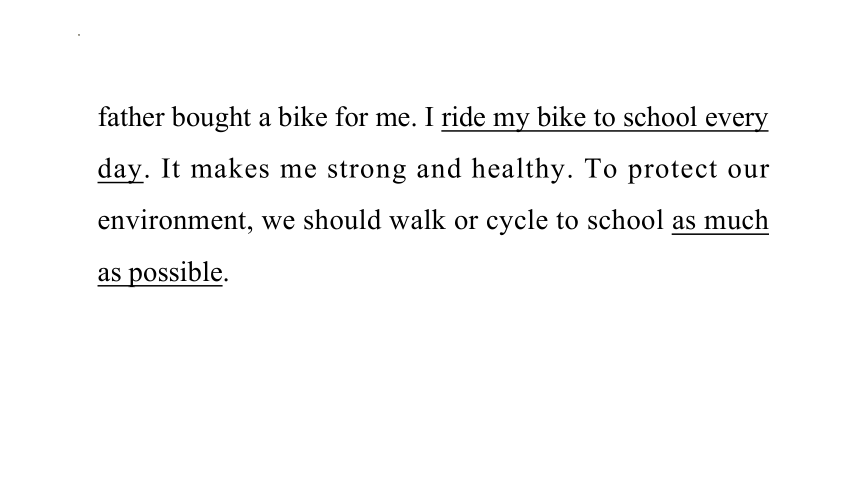

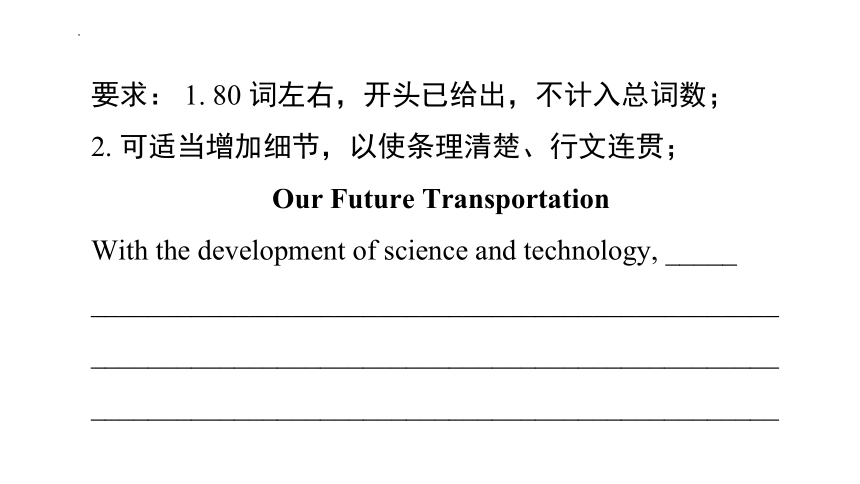
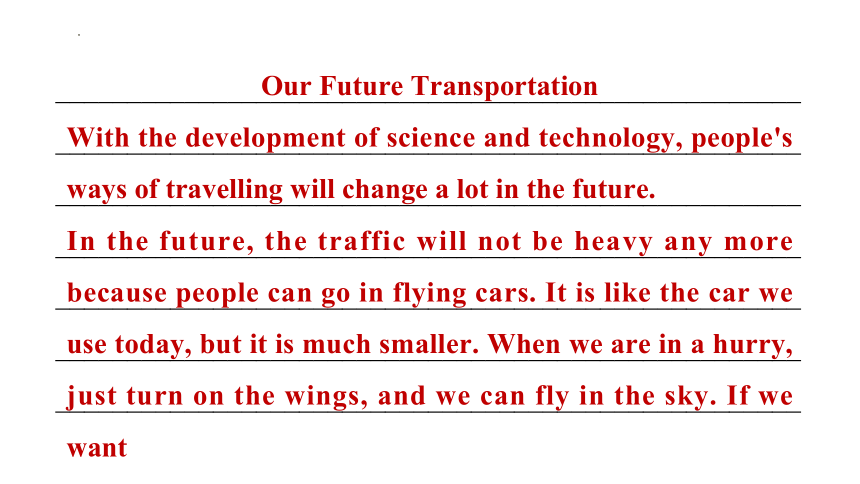
文档简介
(共34张PPT)
写作能力提升练
Unit 6 Go with Transportation!
单词:
hometown, Britain, seldom, rapid
短语:
on foot, a new type of, take a train, be born,
get on, get off, work on, put…together
句 型:
1. You could take a ship to your hometown!
2. But with a transporter, it would take just a few seconds.
3. In the future, cars will probably use water or sun energy to power them.
交通工具的多样化给人们的出行带来了很大的便利,不同的人会选择不同的交通方式。你和你的同学是怎么去上学的?请以“How Do We Go to School ”为题写一篇 80 词左右的英语短文,介绍一下大家的出行方式。
提示: 1. How do we go to school
2. Why do we go to school by…
【审题指导】
1. 体裁: 说明文
2. 人称: 介绍自己时用第一人称,介绍他人时用第三人称
3. 时态: 一般现在时态
【思路构建】
【经典范文】
How Do We Go to School
In our class, students go to school in different ways. Some students go to school by bike. Some students walk to school, because it’s good for their health. Some students go to school by subway, because it’s fast. And a few students go to school by car. My home is not far from school, so my
father bought a bike for me. I ride my bike to school every day. It makes me strong and healthy. To protect our environment, we should walk or cycle to school as much as possible.
随着科技的发展,未来人们的生活将会发生很大的变化。你们学校正在开展以“Our Future Transportation” 为主题的征文活动,请根据以下信息提示写一篇英语短文投稿。
提示: 1. Which kind of transportation would
people use 2. What will it be like 3. …
要求: 1. 80 词左右,开头已给出,不计入总词数;
2. 可适当增加细节,以使条理清楚、行文连贯;
Our Future Transportation
With the development of science and technology, _____
________________________________________________
________________________________________________
________________________________________________
____________________________________________________
____________________________________________________
____________________________________________________
____________________________________________________
____________________________________________________
____________________________________________________
____________________________________________________
Our Future Transportation
With the development of science and technology, people's ways of travelling will change a lot in the future.
In the future, the traffic will not be heavy any more because people can go in flying cars. It is like the car we use today, but it is much smaller. When we are in a hurry, just turn on the wings, and we can fly in the sky. If we want
____________________________________________________
____________________________________________________
____________________________________________________
____________________________________________________
____________________________________________________
____________________________________________________
____________________________________________________
to go to the moon, it can turn into a spaceship. It doesn't need any fuel. It can travel by getting energy from the sun. Isn't it cool
To make it come true, we're going to study harder to have more knowledge.
易错考点专练
Unit 6 Go with Transportation!
1
2
3
考点1
eating
to stay
C
提示:点击 进入习题
答案显示
1
2
B
C
考点2
1
2
考点3
A
A
答案显示
1
2
3
4
5
B
A
turn on
turn up
turn off
考点4
6
Turn down
1
2
3
考点5
get on
got off
got in/into
答案显示
4
got out of
考点1 allow 的用法。
【易错点津】
allow 译为“允许”。常用结构: allow doing sth. 允许做某事; allow sb. to do sth. 允许某人做某事。
Ⅰ. 用所给单词的适当形式填空。
1.We don’t allow __________(eat) in the classroom.
2. My parents don’t allow me __________ (stay) out late.
返回
eating
to stay
Ⅱ. 单项选择。
3. Sorry, sir! Look at the sign. We don’t allow _____cars here.
A. park B. to park
C. parking D. parked
返回
C
考点2 be able to 与can 的辨析。
【易错点津】
be able to可以用于各种时态,can只能用于两种时态,即一般现在时和一般过去时(could);be able to有人称和数的变化,can没有人称和数的变化;can除了表示“能力”外,还可以表示请求、许可或推测,而be able to不可以。
单项选择。
1.[中考·海南改编]The boy_____ be Tom. I saw him reading in the library just now.
A. shouldn’t B. can’t
C. needn’t D. mustn’t
返回
B
2. He will ______ swim after a few days’ practice.
A. can B. could
C. be able to D. is able to
返回
C
考点3 get to, arrive in/at 与reach 的辨析。
【易错点津】
get to,arrive in/at与reach均表示“到达”。get to后接地点名词;arrive是不及物动词,其后若接大地点时,常用介词in,若接小地点时,则用介词at;reach是及物动词,后面接表地点的名词作宾语。
单项选择。
1. We arrived _____Beijing on September 17th.
A. in B. to C. on D. at
返回
A
2. Please tell me when the train _____.
A. arrives B. arrives at
C. reaches D. gets to
返回
A
考点4 turn on, turn off, turn up 与turn down的辨析。
【易错点津】
turn on意为“打开”;turn off意为“关闭”;turn up意为“把声音调大一些”;turn down意为“把声音调低一些;拒绝”。
Ⅰ. 单项选择。
1. —Can I _____the radio
— You’d better not. It is noisy enough in the room.
A. turn to B. turn on
C. turn off D. turn around
返回
B
2. It’s hard to _____bananas. They taste good and you don’t have to wash them before you eat them.
A. turn down B. turn on
C. turn up D. turn off
返回
A
Ⅱ. 用 turn off, turn on, turn up 或 turn down 的适当形式填空。
3. I want to watch the weather report on TV. Please __________ the TV for me!
4. Do you mind if I __________ the TV a bit I can’t hear it clearly.
返回
turn on
turn up
返回
5.[石家庄二十七中期中]Please remind Ann to ___________the lights when she leaves the office. She always forgets to do that.
6. ___________ the TV, Tony! I am talking with your aunt right now.
turn off
Turn down
考点5 get on, get off, get in/into 与 get out of的辨析。
【易错点津】
get on和get off 指上、下大的交通工具,如巴士、火车、轮船等。而get in/into和get out of 指上、下小型交通工具,如小汽车、的士等。
用 get on, get off, get in/ into 或 get out of 的适当形式填空。
1. — Why are you looking so sad, Helen?
— I can’t __________the train because I left my ticket in my office.
2.[中考·连云港]Timmy and Andy __________ the bus and walked towards the sports centre directly.
get on
got off
返回
3. Mary quickly __________ a car and left without a word.
4. Mom and Mike __________ the taxi and ran to the hall. They didn’t want to miss the wedding.
返回
got in/into
got out of
写作能力提升练
Unit 6 Go with Transportation!
单词:
hometown, Britain, seldom, rapid
短语:
on foot, a new type of, take a train, be born,
get on, get off, work on, put…together
句 型:
1. You could take a ship to your hometown!
2. But with a transporter, it would take just a few seconds.
3. In the future, cars will probably use water or sun energy to power them.
交通工具的多样化给人们的出行带来了很大的便利,不同的人会选择不同的交通方式。你和你的同学是怎么去上学的?请以“How Do We Go to School ”为题写一篇 80 词左右的英语短文,介绍一下大家的出行方式。
提示: 1. How do we go to school
2. Why do we go to school by…
【审题指导】
1. 体裁: 说明文
2. 人称: 介绍自己时用第一人称,介绍他人时用第三人称
3. 时态: 一般现在时态
【思路构建】
【经典范文】
How Do We Go to School
In our class, students go to school in different ways. Some students go to school by bike. Some students walk to school, because it’s good for their health. Some students go to school by subway, because it’s fast. And a few students go to school by car. My home is not far from school, so my
father bought a bike for me. I ride my bike to school every day. It makes me strong and healthy. To protect our environment, we should walk or cycle to school as much as possible.
随着科技的发展,未来人们的生活将会发生很大的变化。你们学校正在开展以“Our Future Transportation” 为主题的征文活动,请根据以下信息提示写一篇英语短文投稿。
提示: 1. Which kind of transportation would
people use 2. What will it be like 3. …
要求: 1. 80 词左右,开头已给出,不计入总词数;
2. 可适当增加细节,以使条理清楚、行文连贯;
Our Future Transportation
With the development of science and technology, _____
________________________________________________
________________________________________________
________________________________________________
____________________________________________________
____________________________________________________
____________________________________________________
____________________________________________________
____________________________________________________
____________________________________________________
____________________________________________________
Our Future Transportation
With the development of science and technology, people's ways of travelling will change a lot in the future.
In the future, the traffic will not be heavy any more because people can go in flying cars. It is like the car we use today, but it is much smaller. When we are in a hurry, just turn on the wings, and we can fly in the sky. If we want
____________________________________________________
____________________________________________________
____________________________________________________
____________________________________________________
____________________________________________________
____________________________________________________
____________________________________________________
to go to the moon, it can turn into a spaceship. It doesn't need any fuel. It can travel by getting energy from the sun. Isn't it cool
To make it come true, we're going to study harder to have more knowledge.
易错考点专练
Unit 6 Go with Transportation!
1
2
3
考点1
eating
to stay
C
提示:点击 进入习题
答案显示
1
2
B
C
考点2
1
2
考点3
A
A
答案显示
1
2
3
4
5
B
A
turn on
turn up
turn off
考点4
6
Turn down
1
2
3
考点5
get on
got off
got in/into
答案显示
4
got out of
考点1 allow 的用法。
【易错点津】
allow 译为“允许”。常用结构: allow doing sth. 允许做某事; allow sb. to do sth. 允许某人做某事。
Ⅰ. 用所给单词的适当形式填空。
1.We don’t allow __________(eat) in the classroom.
2. My parents don’t allow me __________ (stay) out late.
返回
eating
to stay
Ⅱ. 单项选择。
3. Sorry, sir! Look at the sign. We don’t allow _____cars here.
A. park B. to park
C. parking D. parked
返回
C
考点2 be able to 与can 的辨析。
【易错点津】
be able to可以用于各种时态,can只能用于两种时态,即一般现在时和一般过去时(could);be able to有人称和数的变化,can没有人称和数的变化;can除了表示“能力”外,还可以表示请求、许可或推测,而be able to不可以。
单项选择。
1.[中考·海南改编]The boy_____ be Tom. I saw him reading in the library just now.
A. shouldn’t B. can’t
C. needn’t D. mustn’t
返回
B
2. He will ______ swim after a few days’ practice.
A. can B. could
C. be able to D. is able to
返回
C
考点3 get to, arrive in/at 与reach 的辨析。
【易错点津】
get to,arrive in/at与reach均表示“到达”。get to后接地点名词;arrive是不及物动词,其后若接大地点时,常用介词in,若接小地点时,则用介词at;reach是及物动词,后面接表地点的名词作宾语。
单项选择。
1. We arrived _____Beijing on September 17th.
A. in B. to C. on D. at
返回
A
2. Please tell me when the train _____.
A. arrives B. arrives at
C. reaches D. gets to
返回
A
考点4 turn on, turn off, turn up 与turn down的辨析。
【易错点津】
turn on意为“打开”;turn off意为“关闭”;turn up意为“把声音调大一些”;turn down意为“把声音调低一些;拒绝”。
Ⅰ. 单项选择。
1. —Can I _____the radio
— You’d better not. It is noisy enough in the room.
A. turn to B. turn on
C. turn off D. turn around
返回
B
2. It’s hard to _____bananas. They taste good and you don’t have to wash them before you eat them.
A. turn down B. turn on
C. turn up D. turn off
返回
A
Ⅱ. 用 turn off, turn on, turn up 或 turn down 的适当形式填空。
3. I want to watch the weather report on TV. Please __________ the TV for me!
4. Do you mind if I __________ the TV a bit I can’t hear it clearly.
返回
turn on
turn up
返回
5.[石家庄二十七中期中]Please remind Ann to ___________the lights when she leaves the office. She always forgets to do that.
6. ___________ the TV, Tony! I am talking with your aunt right now.
turn off
Turn down
考点5 get on, get off, get in/into 与 get out of的辨析。
【易错点津】
get on和get off 指上、下大的交通工具,如巴士、火车、轮船等。而get in/into和get out of 指上、下小型交通工具,如小汽车、的士等。
用 get on, get off, get in/ into 或 get out of 的适当形式填空。
1. — Why are you looking so sad, Helen?
— I can’t __________the train because I left my ticket in my office.
2.[中考·连云港]Timmy and Andy __________ the bus and walked towards the sports centre directly.
get on
got off
返回
3. Mary quickly __________ a car and left without a word.
4. Mom and Mike __________ the taxi and ran to the hall. They didn’t want to miss the wedding.
返回
got in/into
got out of
同课章节目录
- Unit 1 Me and My Class
- Lesson 1 Back to School!
- Lesson 2 Many Faces, One Picture
- Lesson 3 Getting to Know You!
- Lesson 4 Best Friends
- Lesson 5 Meet Ms. Liu
- Lesson 6 Jenny's Week
- Unit 2 My Favourite School Subject
- Lesson 7 Don't Be Late for Class!
- Lesson 8 E-mail Helpers!
- Lesson 9 I Don't Want to Miss Geography !
- Lesson 10 Looking for Lisa
- Lesson 11 Lily Learns about China !
- Lesson 12 Karen's Hair Stood Up!
- Unit Review
- Unit 3 Families Celebrate Togethe
- Lesson 13 I Love Autumn
- Lesson 14 Happy Memories
- Lesson 15 A Present for Li Ming!
- Lesson 16 Happy Thanksgiving!
- Lesson 17 Presents from Canada!
- Lesson 18 Li Ming's Birthday
- Unit Review
- Unit 4 My Neighbourhood
- Lesson 19 The Best Neighourhood
- Lesson 20 No Stopping!
- Lesson 21 Eat a Donut and Turn Right
- Lesson 22 I Like My Neighbourhood
- Lesson 23 People in My Neighbourhood
- Lesson 24 I Need a Map!
- Unit Review
- Unit 5 My Future
- Lesson 25 I Want to Be a Teacher!
- Lesson 26 What Will I Be ?
- Lesson 27 What's Your Advice?
- Lesson 28 Rich or Poor? It Doesn't Matter!
- Lesson 29 Our Ambitions and Dreams
- Lesson 30 A Famous Friend?
- Unit Review
- Unit 6 Go With Transportation !
- Lesson 31 How Do You Travel ?
- Lesson 32 Trains Go Faster !
- Lesson 33 Life on Wheels
- Lesson 34 Flying Donuts
- Lesson 35 Future Transportation
- Lesson 36 Clean Cars ?
- Unit Review
- Unit 7 Enjoy Your Hobby
- Lesson 37 What's Your Hobby ?
- Lesson 38 Hobbies Are Fun!
- Lesson 39 Danny's Hobby
- Lesson 40 What's Paul's Hobby?
- Lesson 41 Show and Tell!
- Lesson 42 The New Club
- Unit Review
- Unit 8 Celebrating Me
- Lesson 43 What Makes You Unique?
- Lesson 44 Georgia Plays Basketball
- Lesson 45 Be Yourself !
- Lesson 46 My Dream
- Lesson 47 I Made It !
- Lesson 48 Li Ming's Report
- Unit Review
